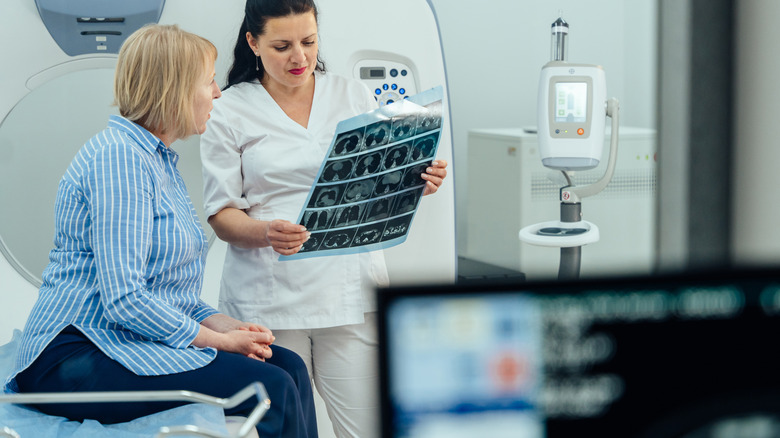Inside The Scary Link Between Pancreatic Cancer And Back Pain
If you haven't already experienced back pain, odds are that you will someday. In fact, up to 85% of people in the United States will deal with back pain at some point, per the American Association of Neurological Surgeons. Fortunately, back pain is frequently a temporary issue. (Read about some sneaky causes of back pain that may surprise you.) But back pain can also turn into a chronic and debilitating concern. According to the World Health Organization, back pain is the top reason for disability around the globe.
Back pain isn't a disorder or disease in itself, but a symptom — and its underlying cause could be harder to pinpoint than you might suspect. Many factors can make your back hurt, including bulging or "slipped" spine discs, sprains and strains, arthritis, weak muscles, obesity, and even common mental health conditions. However, there's another possible (and medically scary) reason that a person might have back pain, and it's one most people don't suspect right away: pancreatic cancer.
Why pain related to pancreatic cancer may be overlooked
In terms of cancers, pancreatic cancer is relatively rare. The American Cancer Society reports that only 3% of annually diagnosed cancers are of the pancreas. That said, pancreatic cancer has a relatively low survival rate when compared to other cancers. On average, 13% of people with pancreatic cancer will live for longer than five years after being staged and treated. However, the survival rate for those whose cancer is caught while it's still localized and hasn't spread is 44% — more than triple the average survival rate.
There's just one issue: Early warning signs of pancreatic cancer tend to be minimal, as well as easily attributable to other aggravators and conditions. As such, people might not associate nagging back pain with pancreatic cancer and may wait to be seen by a doctor. Additionally, depending on where pancreatic cancer occurs within the pancreas, pain may not be an early indicator at all. As Johns Hopkins Medicine notes, a cancerous tumor in the head of the pancreas may not hurt, but may instead facilitate jaundice.
Even doctors may not assume a patient's back pain is pancreatic cancer. Speaking with the Mayo Clinic, gastroenterologist Dr. Santhi Swaroop said, "It is not feasible to investigate every person with indigestion, gas, abdominal pain, or back pain, because a small proportion of them will have this cancer." The same piece explains that unless pancreatic cancer runs in someone's family, doctors typically won't screen for the condition.
How to interpret unusual pain that may indicate pancreatic cancer
How can you make sure that you or a loved one doesn't ignore back pain that could indicate the presence of potential pancreatic cancer? One strategy is to understand the traits of back pain that's related to pancreatic cancer.
For instance, this specific kind of back pain tends to radiate throughout the middle of the back and may feel like it's spreading from the middle of the torso toward the back. Plus, it may be transient and quite unremarkable in terms of intensity. Some patients have also reported back pain under their shoulders or in their upper-middle back.
Because the back pain comes from the pressure created by the growth of tumors, moving around can lead to pain relief. But the longer that tumors continue to grow, the more challenging it may be to make the pain disappear by changing positions. And if the pain is accompanied by weight loss, stomach bloating, bowel changes, or the onset of type 2 diabetes, it may be time to seek medical advice.
If you're told you have pancreatic cancer, you might be directed to take over-the-counter or prescription painkillers and other drugs to manage your back pain while you explore other treatments for the cancer. Alternatively, your doctor may recommend a shot of a substance that can disrupt the pain receptors in your back. Or, you could try complementary pain management therapies like hypnosis, meditation, or acupuncture with the support of your oncologist.


